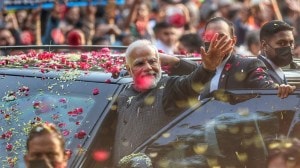Iran vote fallout: Left ‘defers’ meeting UPA
Snubbed by the UPA on the Iran vote issue, privatisation of Delhi and Mumbai airports and FDI in retail, Left parties today handed out a thr...

Snubbed by the UPA on the Iran vote issue, privatisation of Delhi and Mumbai airports and FDI in retail, Left parties today handed out a threat to the ruling coalition by deciding to “defer” the UPA-Left coordination meeting slated for Wednesday.
Stepping up their opposition to the UPA, the four Left parties that support the UPA government from outside will now individually review their relationship with the ruling alliance and discuss all issues internally in party platforms before holding another meeting of the Left to chalk out a future course of action.
This was communicated to Congress leader Ahmed Patel during the meeting of the Left parties today. He was told that the Left parties would have a general review of their relationship with the UPA and how their objections on key Left concerns have been overlooked.
A strong reaction from the Left parties was expected by the UPA. At his recent press conference, Prime Minister Manmohan Singh had pointed to the possibility of friction with the Left in the run-up to the polls in West Bengal and Kerala.
The Left parties had earlier walked out of the UPA-Left coordination meetings last June 26, following the government’s decision to disinvest BHEL. In response to the Left’s opposition, the government went back on that decision and this was communicated to the Left parties by UPA chairperson Sonia Gandhi. Subsequently, on October 13, the Left parties decided to resume the coordination meetings.
Apart from Iran, the most recent of these has been the government’s decision to bring down the EPF rate to 8.5 per cent from the earlier 9.5 per cent and privatisation of Delhi and Mumbai airports.
Left leaders said the meeting was only being deferred, but with questions being raised within parties on repeated Left climbdowns on their key concerns, there was need for a well thought out course of action while dealing with the UPA.
The CPM politburo will meet this week as will the CPI secretariat. The Forward Bloc and RSP will also meet before the Budget session of Parliament.
Shortly after the Left meeting began, they were presented with a draft on the Left’s response to the IAEA vote on Iran by CPM general secretary Prakash Karat and after a short discussion, as the meeting was winding up, the issue of the relationship with the UPA was raised. That prolonged what would have been a short meeting.
Key points raised by G Devarajan, secretary of the Forward Bloc was that the government had disregarded the Left’s objections and proposals on the privatisation of profit-making PSUs, modernisation of Delhi and Mumbai airports, FDI in retail and corporatisation of ordnance factories and there was need to send a strong message to the UPA. This was supported by the CPI. “We have decided not to attend the February 8 UPA-Left coordination meeting,” Devarajan said.
RSP’s Abani Roy suggested that under the circumstances—India’s vote against Iran over Left objections and the government’s economic policies—there was a need to review support to the UPA. But, that found little support from other partners.
On the key issue of India’s vote on Iran, the Left parties called for a full debate in Parliament on the issue. But with Russia and China joining the P5 countries to report Iran to the security council, the Left studiously avoided a confrontationist stand against the UPA even though India voted against Iran in the IAEA.
“We knew they (the government) would take this step. We aren’t making this (India’s vote against against Iran on Saturday) a big issue now because it will be the main issue in March when the IAEA director-general’s report is submitted,” CPM general secretary Prakash Karat said after a meeting of the Left parties on Sunday.
He did not comment on Russia and China voting with other P-5 nations against Iran: “We are not going into this. Our position is that India should have friendly relations with Iran and the Iran issue should stay within the purview of the IAEA.”
Photos


- 01
- 02
- 03
- 04
- 05





























